Contract Law Case Study: Analyzing Agreement Validity & Intent
VerifiedAdded on 2023/06/05
|7
|2105
|82
Case Study
AI Summary
This case study provides solutions to three distinct contract law issues. The first issue examines whether John can sue George based on a verbal agreement related to share prices and a Mini Cooper, concluding that a valid contract exists due to offer, acceptance, and consideration. The second issue analyzes whether Paul can sue Ringo for reneging on an agreement to buy a travel agency, determining that a contract exists despite being 'subject to approval' because of the parties' intent. The third issue explores whether Mick can sue Keith for the sale of a restaurant, concluding that a valid contract exists because the parties agreed to negotiate in good faith. The document includes relevant case laws and references. Desklib offers a wealth of similar solved assignments and past papers to aid students in their studies.
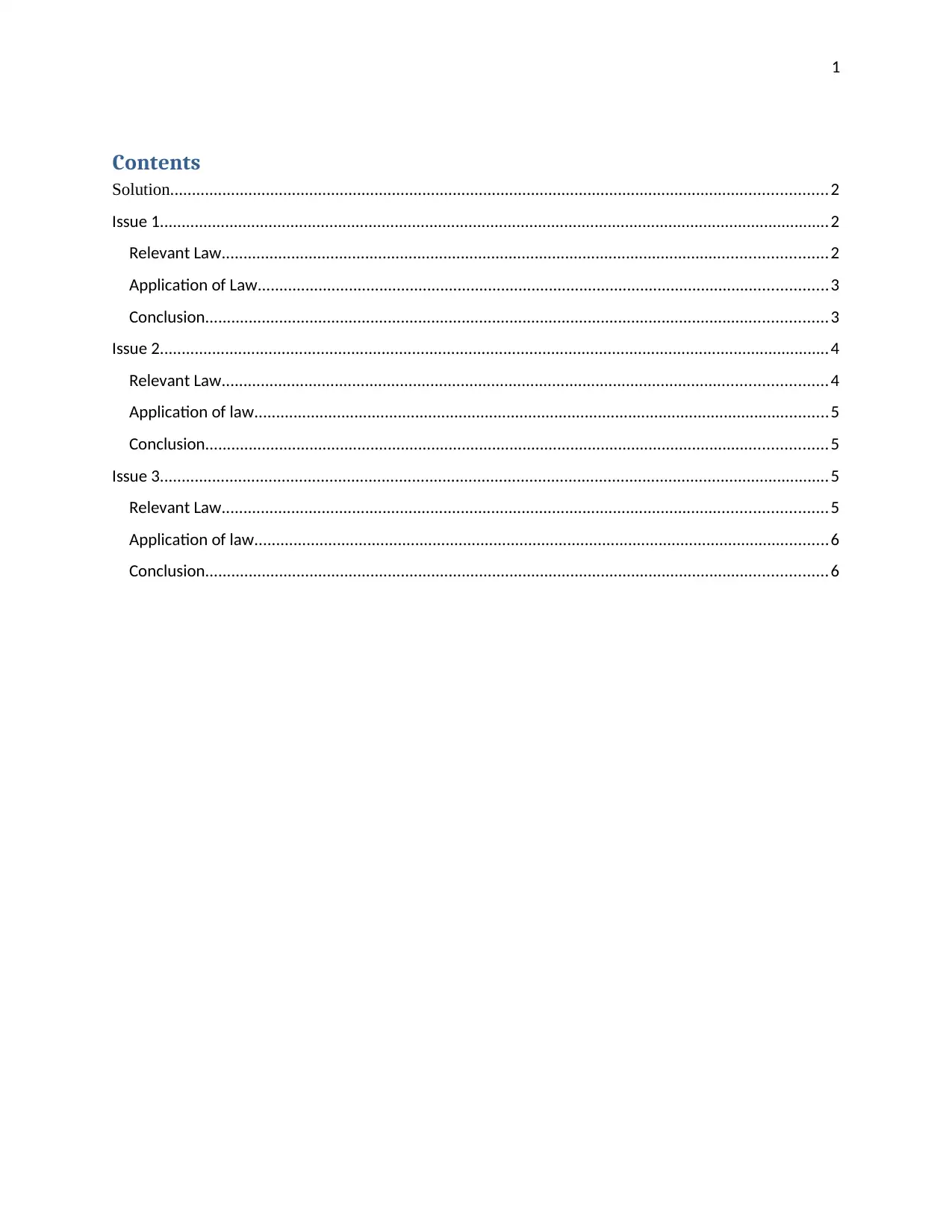
1
Contents
Solution.......................................................................................................................................................2
Issue 1..........................................................................................................................................................2
Relevant Law...........................................................................................................................................2
Application of Law...................................................................................................................................3
Conclusion...............................................................................................................................................3
Issue 2..........................................................................................................................................................4
Relevant Law...........................................................................................................................................4
Application of law....................................................................................................................................5
Conclusion...............................................................................................................................................5
Issue 3..........................................................................................................................................................5
Relevant Law...........................................................................................................................................5
Application of law....................................................................................................................................6
Conclusion...............................................................................................................................................6
Contents
Solution.......................................................................................................................................................2
Issue 1..........................................................................................................................................................2
Relevant Law...........................................................................................................................................2
Application of Law...................................................................................................................................3
Conclusion...............................................................................................................................................3
Issue 2..........................................................................................................................................................4
Relevant Law...........................................................................................................................................4
Application of law....................................................................................................................................5
Conclusion...............................................................................................................................................5
Issue 3..........................................................................................................................................................5
Relevant Law...........................................................................................................................................5
Application of law....................................................................................................................................6
Conclusion...............................................................................................................................................6
Paraphrase This Document
Need a fresh take? Get an instant paraphrase of this document with our AI Paraphraser
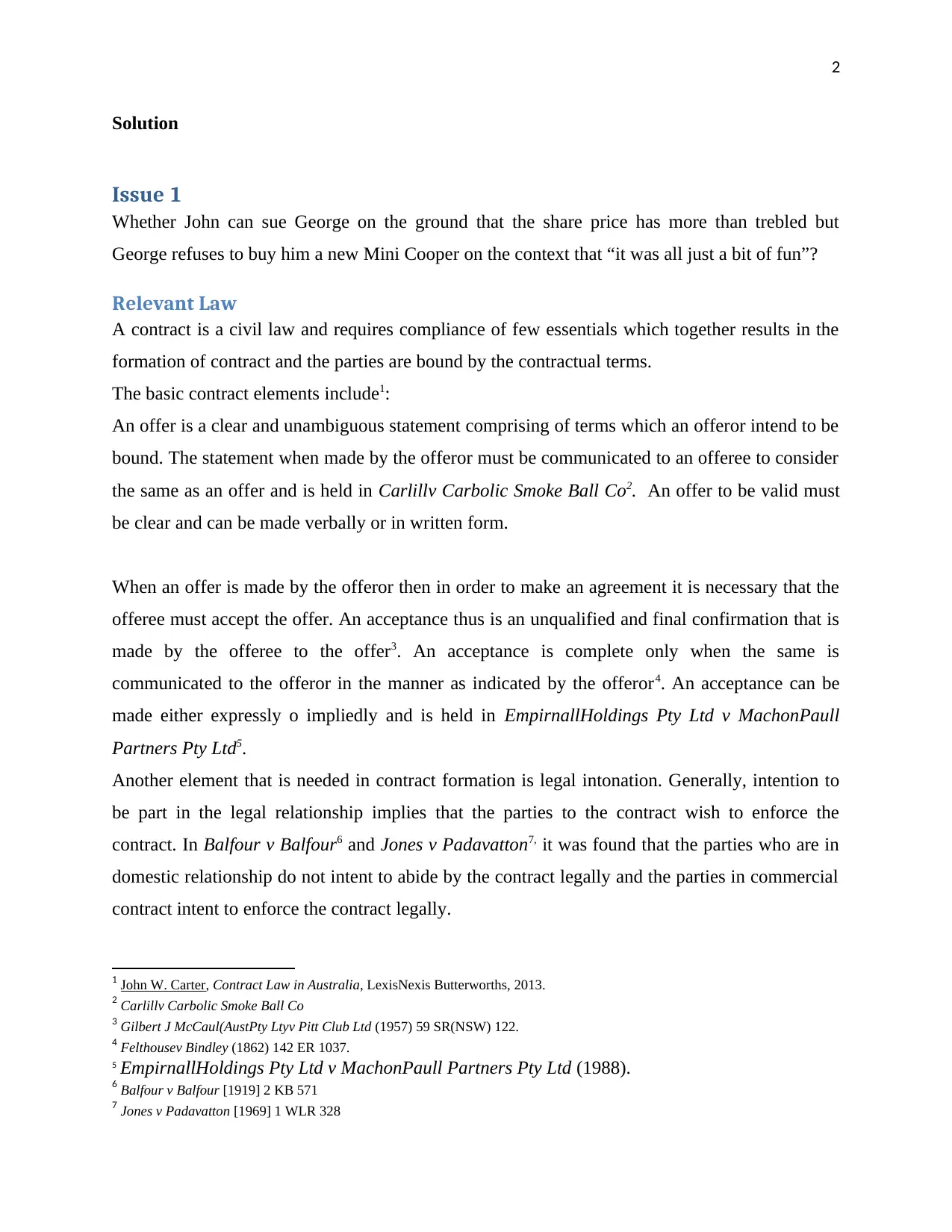
2
Solution
Issue 1
Whether John can sue George on the ground that the share price has more than trebled but
George refuses to buy him a new Mini Cooper on the context that “it was all just a bit of fun”?
Relevant Law
A contract is a civil law and requires compliance of few essentials which together results in the
formation of contract and the parties are bound by the contractual terms.
The basic contract elements include1:
An offer is a clear and unambiguous statement comprising of terms which an offeror intend to be
bound. The statement when made by the offeror must be communicated to an offeree to consider
the same as an offer and is held in Carlillv Carbolic Smoke Ball Co2. An offer to be valid must
be clear and can be made verbally or in written form.
When an offer is made by the offeror then in order to make an agreement it is necessary that the
offeree must accept the offer. An acceptance thus is an unqualified and final confirmation that is
made by the offeree to the offer3. An acceptance is complete only when the same is
communicated to the offeror in the manner as indicated by the offeror4. An acceptance can be
made either expressly o impliedly and is held in EmpirnallHoldings Pty Ltd v MachonPaull
Partners Pty Ltd5.
Another element that is needed in contract formation is legal intonation. Generally, intention to
be part in the legal relationship implies that the parties to the contract wish to enforce the
contract. In Balfour v Balfour6 and Jones v Padavatton7, it was found that the parties who are in
domestic relationship do not intent to abide by the contract legally and the parties in commercial
contract intent to enforce the contract legally.
1 John W. Carter, Contract Law in Australia, LexisNexis Butterworths, 2013.
2 Carlillv Carbolic Smoke Ball Co
3 Gilbert J McCaul(AustPty Ltyv Pitt Club Ltd (1957) 59 SR(NSW) 122.
4 Felthousev Bindley (1862) 142 ER 1037.
5 EmpirnallHoldings Pty Ltd v MachonPaull Partners Pty Ltd (1988).
6 Balfour v Balfour [1919] 2 KB 571
7 Jones v Padavatton [1969] 1 WLR 328
Solution
Issue 1
Whether John can sue George on the ground that the share price has more than trebled but
George refuses to buy him a new Mini Cooper on the context that “it was all just a bit of fun”?
Relevant Law
A contract is a civil law and requires compliance of few essentials which together results in the
formation of contract and the parties are bound by the contractual terms.
The basic contract elements include1:
An offer is a clear and unambiguous statement comprising of terms which an offeror intend to be
bound. The statement when made by the offeror must be communicated to an offeree to consider
the same as an offer and is held in Carlillv Carbolic Smoke Ball Co2. An offer to be valid must
be clear and can be made verbally or in written form.
When an offer is made by the offeror then in order to make an agreement it is necessary that the
offeree must accept the offer. An acceptance thus is an unqualified and final confirmation that is
made by the offeree to the offer3. An acceptance is complete only when the same is
communicated to the offeror in the manner as indicated by the offeror4. An acceptance can be
made either expressly o impliedly and is held in EmpirnallHoldings Pty Ltd v MachonPaull
Partners Pty Ltd5.
Another element that is needed in contract formation is legal intonation. Generally, intention to
be part in the legal relationship implies that the parties to the contract wish to enforce the
contract. In Balfour v Balfour6 and Jones v Padavatton7, it was found that the parties who are in
domestic relationship do not intent to abide by the contract legally and the parties in commercial
contract intent to enforce the contract legally.
1 John W. Carter, Contract Law in Australia, LexisNexis Butterworths, 2013.
2 Carlillv Carbolic Smoke Ball Co
3 Gilbert J McCaul(AustPty Ltyv Pitt Club Ltd (1957) 59 SR(NSW) 122.
4 Felthousev Bindley (1862) 142 ER 1037.
5 EmpirnallHoldings Pty Ltd v MachonPaull Partners Pty Ltd (1988).
6 Balfour v Balfour [1919] 2 KB 571
7 Jones v Padavatton [1969] 1 WLR 328
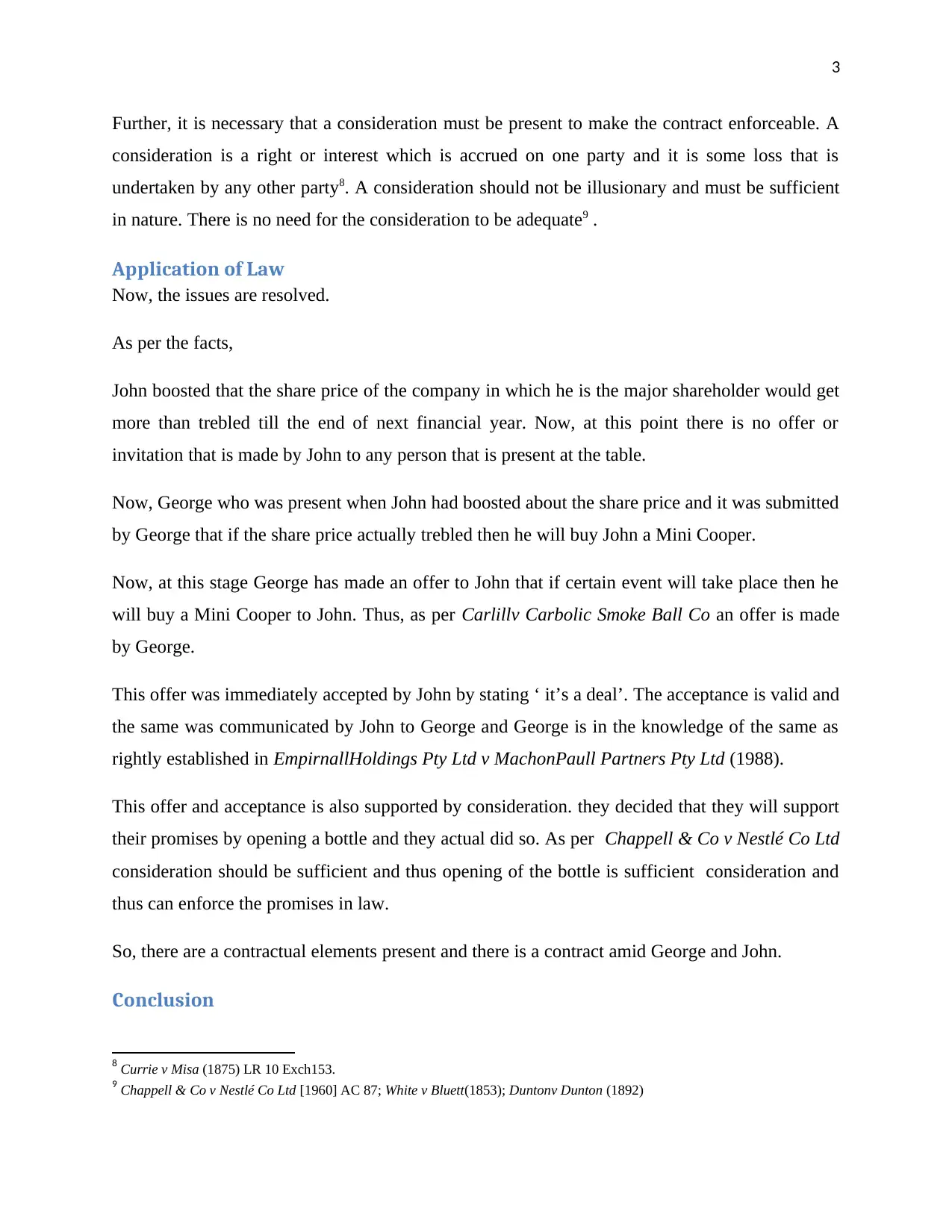
3
Further, it is necessary that a consideration must be present to make the contract enforceable. A
consideration is a right or interest which is accrued on one party and it is some loss that is
undertaken by any other party8. A consideration should not be illusionary and must be sufficient
in nature. There is no need for the consideration to be adequate9 .
Application of Law
Now, the issues are resolved.
As per the facts,
John boosted that the share price of the company in which he is the major shareholder would get
more than trebled till the end of next financial year. Now, at this point there is no offer or
invitation that is made by John to any person that is present at the table.
Now, George who was present when John had boosted about the share price and it was submitted
by George that if the share price actually trebled then he will buy John a Mini Cooper.
Now, at this stage George has made an offer to John that if certain event will take place then he
will buy a Mini Cooper to John. Thus, as per Carlillv Carbolic Smoke Ball Co an offer is made
by George.
This offer was immediately accepted by John by stating ‘ it’s a deal’. The acceptance is valid and
the same was communicated by John to George and George is in the knowledge of the same as
rightly established in EmpirnallHoldings Pty Ltd v MachonPaull Partners Pty Ltd (1988).
This offer and acceptance is also supported by consideration. they decided that they will support
their promises by opening a bottle and they actual did so. As per Chappell & Co v Nestlé Co Ltd
consideration should be sufficient and thus opening of the bottle is sufficient consideration and
thus can enforce the promises in law.
So, there are a contractual elements present and there is a contract amid George and John.
Conclusion
8 Currie v Misa (1875) LR 10 Exch153.
9 Chappell & Co v Nestlé Co Ltd [1960] AC 87; White v Bluett(1853); Duntonv Dunton (1892)
Further, it is necessary that a consideration must be present to make the contract enforceable. A
consideration is a right or interest which is accrued on one party and it is some loss that is
undertaken by any other party8. A consideration should not be illusionary and must be sufficient
in nature. There is no need for the consideration to be adequate9 .
Application of Law
Now, the issues are resolved.
As per the facts,
John boosted that the share price of the company in which he is the major shareholder would get
more than trebled till the end of next financial year. Now, at this point there is no offer or
invitation that is made by John to any person that is present at the table.
Now, George who was present when John had boosted about the share price and it was submitted
by George that if the share price actually trebled then he will buy John a Mini Cooper.
Now, at this stage George has made an offer to John that if certain event will take place then he
will buy a Mini Cooper to John. Thus, as per Carlillv Carbolic Smoke Ball Co an offer is made
by George.
This offer was immediately accepted by John by stating ‘ it’s a deal’. The acceptance is valid and
the same was communicated by John to George and George is in the knowledge of the same as
rightly established in EmpirnallHoldings Pty Ltd v MachonPaull Partners Pty Ltd (1988).
This offer and acceptance is also supported by consideration. they decided that they will support
their promises by opening a bottle and they actual did so. As per Chappell & Co v Nestlé Co Ltd
consideration should be sufficient and thus opening of the bottle is sufficient consideration and
thus can enforce the promises in law.
So, there are a contractual elements present and there is a contract amid George and John.
Conclusion
8 Currie v Misa (1875) LR 10 Exch153.
9 Chappell & Co v Nestlé Co Ltd [1960] AC 87; White v Bluett(1853); Duntonv Dunton (1892)
⊘ This is a preview!⊘
Do you want full access?
Subscribe today to unlock all pages.

Trusted by 1+ million students worldwide
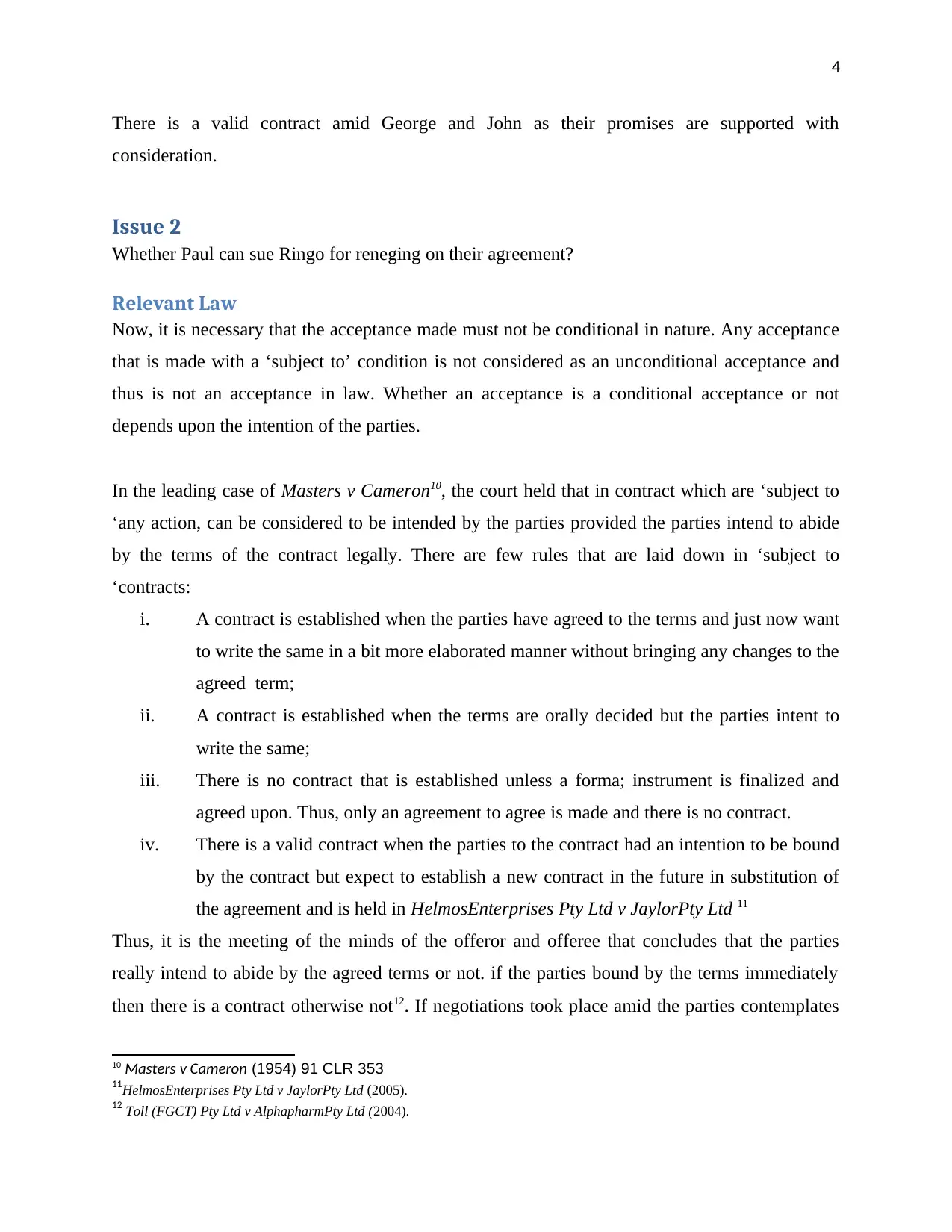
4
There is a valid contract amid George and John as their promises are supported with
consideration.
Issue 2
Whether Paul can sue Ringo for reneging on their agreement?
Relevant Law
Now, it is necessary that the acceptance made must not be conditional in nature. Any acceptance
that is made with a ‘subject to’ condition is not considered as an unconditional acceptance and
thus is not an acceptance in law. Whether an acceptance is a conditional acceptance or not
depends upon the intention of the parties.
In the leading case of Masters v Cameron10, the court held that in contract which are ‘subject to
‘any action, can be considered to be intended by the parties provided the parties intend to abide
by the terms of the contract legally. There are few rules that are laid down in ‘subject to
‘contracts:
i. A contract is established when the parties have agreed to the terms and just now want
to write the same in a bit more elaborated manner without bringing any changes to the
agreed term;
ii. A contract is established when the terms are orally decided but the parties intent to
write the same;
iii. There is no contract that is established unless a forma; instrument is finalized and
agreed upon. Thus, only an agreement to agree is made and there is no contract.
iv. There is a valid contract when the parties to the contract had an intention to be bound
by the contract but expect to establish a new contract in the future in substitution of
the agreement and is held in HelmosEnterprises Pty Ltd v JaylorPty Ltd 11
Thus, it is the meeting of the minds of the offeror and offeree that concludes that the parties
really intend to abide by the agreed terms or not. if the parties bound by the terms immediately
then there is a contract otherwise not12. If negotiations took place amid the parties contemplates
10 Masters v Cameron (1954) 91 CLR 353
11HelmosEnterprises Pty Ltd v JaylorPty Ltd (2005).
12 Toll (FGCT) Pty Ltd v AlphapharmPty Ltd (2004).
There is a valid contract amid George and John as their promises are supported with
consideration.
Issue 2
Whether Paul can sue Ringo for reneging on their agreement?
Relevant Law
Now, it is necessary that the acceptance made must not be conditional in nature. Any acceptance
that is made with a ‘subject to’ condition is not considered as an unconditional acceptance and
thus is not an acceptance in law. Whether an acceptance is a conditional acceptance or not
depends upon the intention of the parties.
In the leading case of Masters v Cameron10, the court held that in contract which are ‘subject to
‘any action, can be considered to be intended by the parties provided the parties intend to abide
by the terms of the contract legally. There are few rules that are laid down in ‘subject to
‘contracts:
i. A contract is established when the parties have agreed to the terms and just now want
to write the same in a bit more elaborated manner without bringing any changes to the
agreed term;
ii. A contract is established when the terms are orally decided but the parties intent to
write the same;
iii. There is no contract that is established unless a forma; instrument is finalized and
agreed upon. Thus, only an agreement to agree is made and there is no contract.
iv. There is a valid contract when the parties to the contract had an intention to be bound
by the contract but expect to establish a new contract in the future in substitution of
the agreement and is held in HelmosEnterprises Pty Ltd v JaylorPty Ltd 11
Thus, it is the meeting of the minds of the offeror and offeree that concludes that the parties
really intend to abide by the agreed terms or not. if the parties bound by the terms immediately
then there is a contract otherwise not12. If negotiations took place amid the parties contemplates
10 Masters v Cameron (1954) 91 CLR 353
11HelmosEnterprises Pty Ltd v JaylorPty Ltd (2005).
12 Toll (FGCT) Pty Ltd v AlphapharmPty Ltd (2004).
Paraphrase This Document
Need a fresh take? Get an instant paraphrase of this document with our AI Paraphraser
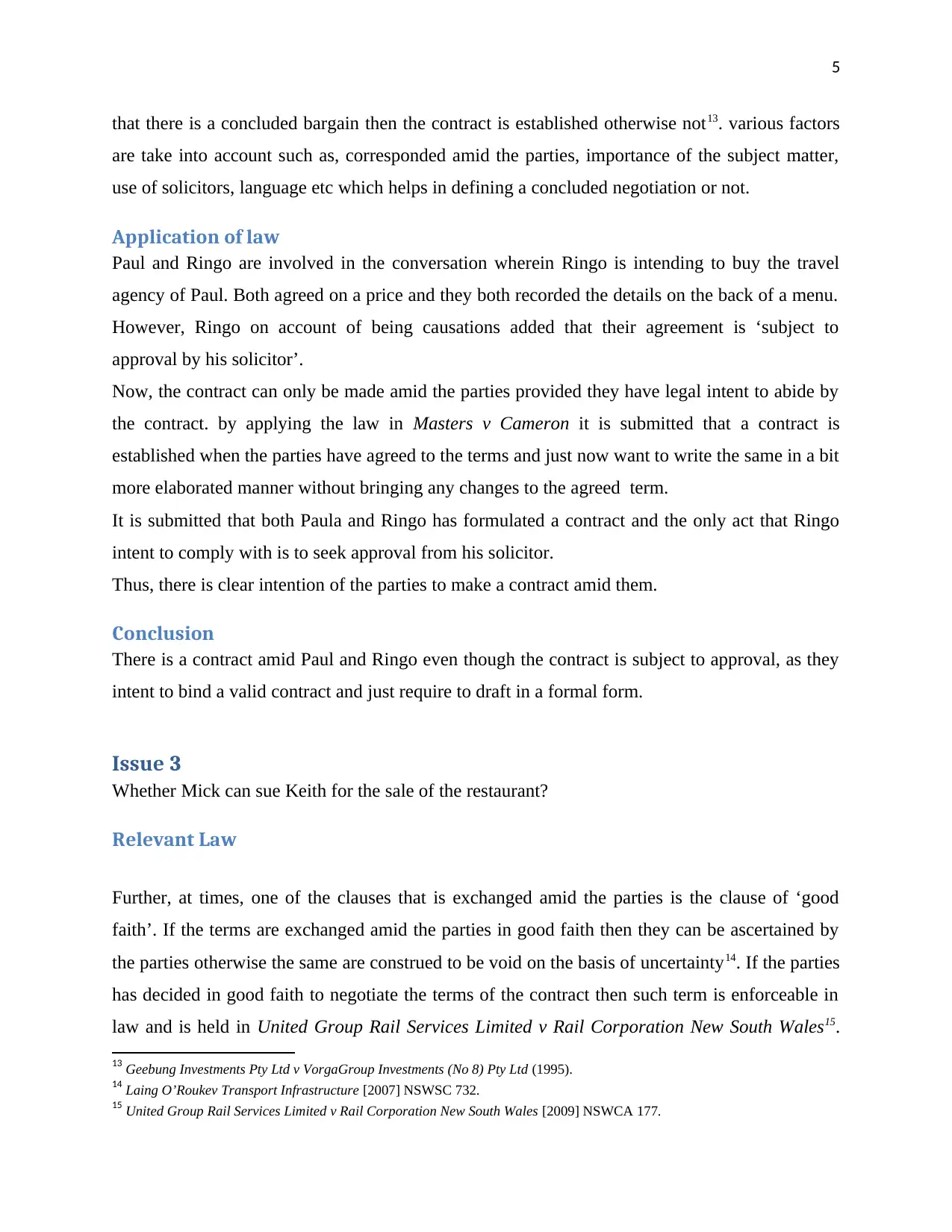
5
that there is a concluded bargain then the contract is established otherwise not13. various factors
are take into account such as, corresponded amid the parties, importance of the subject matter,
use of solicitors, language etc which helps in defining a concluded negotiation or not.
Application of law
Paul and Ringo are involved in the conversation wherein Ringo is intending to buy the travel
agency of Paul. Both agreed on a price and they both recorded the details on the back of a menu.
However, Ringo on account of being causations added that their agreement is ‘subject to
approval by his solicitor’.
Now, the contract can only be made amid the parties provided they have legal intent to abide by
the contract. by applying the law in Masters v Cameron it is submitted that a contract is
established when the parties have agreed to the terms and just now want to write the same in a bit
more elaborated manner without bringing any changes to the agreed term.
It is submitted that both Paula and Ringo has formulated a contract and the only act that Ringo
intent to comply with is to seek approval from his solicitor.
Thus, there is clear intention of the parties to make a contract amid them.
Conclusion
There is a contract amid Paul and Ringo even though the contract is subject to approval, as they
intent to bind a valid contract and just require to draft in a formal form.
Issue 3
Whether Mick can sue Keith for the sale of the restaurant?
Relevant Law
Further, at times, one of the clauses that is exchanged amid the parties is the clause of ‘good
faith’. If the terms are exchanged amid the parties in good faith then they can be ascertained by
the parties otherwise the same are construed to be void on the basis of uncertainty14. If the parties
has decided in good faith to negotiate the terms of the contract then such term is enforceable in
law and is held in United Group Rail Services Limited v Rail Corporation New South Wales15.
13 Geebung Investments Pty Ltd v VorgaGroup Investments (No 8) Pty Ltd (1995).
14 Laing O’Roukev Transport Infrastructure [2007] NSWSC 732.
15 United Group Rail Services Limited v Rail Corporation New South Wales [2009] NSWCA 177.
that there is a concluded bargain then the contract is established otherwise not13. various factors
are take into account such as, corresponded amid the parties, importance of the subject matter,
use of solicitors, language etc which helps in defining a concluded negotiation or not.
Application of law
Paul and Ringo are involved in the conversation wherein Ringo is intending to buy the travel
agency of Paul. Both agreed on a price and they both recorded the details on the back of a menu.
However, Ringo on account of being causations added that their agreement is ‘subject to
approval by his solicitor’.
Now, the contract can only be made amid the parties provided they have legal intent to abide by
the contract. by applying the law in Masters v Cameron it is submitted that a contract is
established when the parties have agreed to the terms and just now want to write the same in a bit
more elaborated manner without bringing any changes to the agreed term.
It is submitted that both Paula and Ringo has formulated a contract and the only act that Ringo
intent to comply with is to seek approval from his solicitor.
Thus, there is clear intention of the parties to make a contract amid them.
Conclusion
There is a contract amid Paul and Ringo even though the contract is subject to approval, as they
intent to bind a valid contract and just require to draft in a formal form.
Issue 3
Whether Mick can sue Keith for the sale of the restaurant?
Relevant Law
Further, at times, one of the clauses that is exchanged amid the parties is the clause of ‘good
faith’. If the terms are exchanged amid the parties in good faith then they can be ascertained by
the parties otherwise the same are construed to be void on the basis of uncertainty14. If the parties
has decided in good faith to negotiate the terms of the contract then such term is enforceable in
law and is held in United Group Rail Services Limited v Rail Corporation New South Wales15.
13 Geebung Investments Pty Ltd v VorgaGroup Investments (No 8) Pty Ltd (1995).
14 Laing O’Roukev Transport Infrastructure [2007] NSWSC 732.
15 United Group Rail Services Limited v Rail Corporation New South Wales [2009] NSWCA 177.

6
The terms are considered to be in good faith when they are reasonable and do not vary with the
express terms of the contract16.
Application of law
Now, Mick and Keith are in conversation wherein Mick is intending to buy the restaurant of
Keith. Since the deal was complicated and there were several issues that need to be address, so
they decided that they would continue the discussion in good faith in the following week. At this
stage it is submitted that both Mick and Keith intent to abide by the negotiations that are carried
on by them. they intend to abide by the terms and in good faith have just postpond to agreement
at a later stage in good faith. Thus, by applying the law in United Group Rail Services Limited v
Rail Corporation New South Wales, both Mick and Keith have decided in good faith to negotiate
the terms of the contract and thus the terms is enforceable in law.
So, Keith cannot refuse to sell the restaurant to Mick.
Conclusion
A valid contract is made amid Mick and Keith as the terms are exchanged with intent to abide by
the them and is to be decided at a later stage and this shift is made in good faith.
16 Hospital Products v United States Surgical Corp(2004):
The terms are considered to be in good faith when they are reasonable and do not vary with the
express terms of the contract16.
Application of law
Now, Mick and Keith are in conversation wherein Mick is intending to buy the restaurant of
Keith. Since the deal was complicated and there were several issues that need to be address, so
they decided that they would continue the discussion in good faith in the following week. At this
stage it is submitted that both Mick and Keith intent to abide by the negotiations that are carried
on by them. they intend to abide by the terms and in good faith have just postpond to agreement
at a later stage in good faith. Thus, by applying the law in United Group Rail Services Limited v
Rail Corporation New South Wales, both Mick and Keith have decided in good faith to negotiate
the terms of the contract and thus the terms is enforceable in law.
So, Keith cannot refuse to sell the restaurant to Mick.
Conclusion
A valid contract is made amid Mick and Keith as the terms are exchanged with intent to abide by
the them and is to be decided at a later stage and this shift is made in good faith.
16 Hospital Products v United States Surgical Corp(2004):
⊘ This is a preview!⊘
Do you want full access?
Subscribe today to unlock all pages.

Trusted by 1+ million students worldwide

7
Reference List
Books/Articles/Journals
Carter, John , Contract Law in Australia, LexisNexis Butterworths, 2013.
Case Laws
Balfour v Balfour [1919] 2 KB 571
Carlillv Carbolic Smoke Ball Co;
Currie v Misa (1875) LR 10 Exch153.
Chappell & Co v Nestlé Co Ltd [1960] AC 87; White v Bluett(1853); Duntonv Dunton (1892)
EmpirnallHoldings Pty Ltd v MachonPaull Partners Pty Ltd (1988).
Felthousev Bindley (1862) 142 ER 1037.
Geebung Investments Pty Ltd v VorgaGroup Investments (No 8) Pty Ltd (1995).
Gilbert J McCaul(AustPty Ltyv Pitt Club Ltd (1957) 59 SR(NSW) 122.
HelmosEnterprises Pty Ltd v JaylorPty Ltd (2005).
Hospital Products v United States Surgical Corp(2004):
Jones v Padavatton [1969] 1 WLR 328
Masters v Cameron (1954) 91 CLR 353.
Laing O’Roukev Transport Infrastructure [2007] NSWSC 732.
Toll (FGCT) Pty Ltd v AlphapharmPty Ltd (2004).
United Group Rail Services Limited v Rail Corporation New South Wales [2009] NSWCA 177.
Reference List
Books/Articles/Journals
Carter, John , Contract Law in Australia, LexisNexis Butterworths, 2013.
Case Laws
Balfour v Balfour [1919] 2 KB 571
Carlillv Carbolic Smoke Ball Co;
Currie v Misa (1875) LR 10 Exch153.
Chappell & Co v Nestlé Co Ltd [1960] AC 87; White v Bluett(1853); Duntonv Dunton (1892)
EmpirnallHoldings Pty Ltd v MachonPaull Partners Pty Ltd (1988).
Felthousev Bindley (1862) 142 ER 1037.
Geebung Investments Pty Ltd v VorgaGroup Investments (No 8) Pty Ltd (1995).
Gilbert J McCaul(AustPty Ltyv Pitt Club Ltd (1957) 59 SR(NSW) 122.
HelmosEnterprises Pty Ltd v JaylorPty Ltd (2005).
Hospital Products v United States Surgical Corp(2004):
Jones v Padavatton [1969] 1 WLR 328
Masters v Cameron (1954) 91 CLR 353.
Laing O’Roukev Transport Infrastructure [2007] NSWSC 732.
Toll (FGCT) Pty Ltd v AlphapharmPty Ltd (2004).
United Group Rail Services Limited v Rail Corporation New South Wales [2009] NSWCA 177.
1 out of 7
Related Documents
Your All-in-One AI-Powered Toolkit for Academic Success.
+13062052269
info@desklib.com
Available 24*7 on WhatsApp / Email
![[object Object]](/_next/static/media/star-bottom.7253800d.svg)
Unlock your academic potential
Copyright © 2020–2026 A2Z Services. All Rights Reserved. Developed and managed by ZUCOL.




